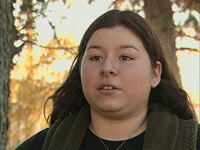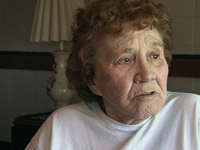Français
Finding Our Talk Season One
- Episode 1: Language Among the Skywalkers: Mohawk
- Episode 2: Language Immersion: Cree
- Episode 3: The Trees are Talking: Algonquin
- Episode 4: The Power of Words: Inuktitut
- Episode 5: Words Travel On Air: Attikamekw/Innu
- Episode 6: Language in the City: Ojibway/Anishinabe
- Episode 7: Getting Into Michif: Michif
- Episode 8 : Plains Talk: Saulteaux
- Episode 9: Breaking New Ground: Mi'kmaw
- Episode 10: A Silent Language: Huron/Wendat
- Episode 11: The Power of One: Innu
- Episode 12: Syllabics: Capturing Language: Cree
- Episode 13: A Remarkable Legacy: Saanich
Finding Our Talk Season Two
Finding Our Talk Season Three
Episode 7: Getting Into Michif - Michif
In this episode, we enter the fascinating and complex world of a language considered by some to be unique in the world - Michif - the language of the Métis of Canada and the US. We meet some of the movers and shakers working politically and through the education system to have Michif recognized as the official language of the Métis, as well as those whose passion and dedication are evidenced at the grass-roots level.
Background
 In the popular imagination, the Métis people are half-breeds, descendants of European fur traders and aboriginal women. In fact, this proud, self-reliant people saw themselves as neither Indian nor European but as Otipemisiwak, a Free People who shared their homeland of Rupert’s Land with both ancestors and newcomers. French and English fur-traders relied heavily on the Métis’ knowledge of the country and their skills at navigating it. It is through their role in the fur trade and the need to communicate in several languages, that the Michif language developed.
In the popular imagination, the Métis people are half-breeds, descendants of European fur traders and aboriginal women. In fact, this proud, self-reliant people saw themselves as neither Indian nor European but as Otipemisiwak, a Free People who shared their homeland of Rupert’s Land with both ancestors and newcomers. French and English fur-traders relied heavily on the Métis’ knowledge of the country and their skills at navigating it. It is through their role in the fur trade and the need to communicate in several languages, that the Michif language developed.
In the 1870’s and 1880’s, under the leadership of Louis Riel, the Métis consented to allow a part of Rupert’s land to become the Province of Manitoba. Soon after, in the only example of inter-provincial war in Canadian history, Ontario’s mercenaries routed the Métis from Manitoba and Saskatchewan.
Despite this attempt to eliminate the “Métis problem”, the Michif language continued to flourish throughout the western provinces and the US. Eventually, different creoles of French, English and Native languages resulted in numerous versions of Michif. One of the most recognized is “Michif-Cree”, a Cree/French version used today in Métis communities of Manitoba and Northern Dakota. The number of speakers of this Michif is estimated at 1,000.
Today, Michif is one of the most threatened of Amerindian languages, most of its speakers above the age of 45. Almost no young people speak it and there are virtually no Michif language programs in the schools. Some people speculate that the language’s endangered position is partially due to the fact that many Métis wanted to conceal their identity, at least the small percentage who could pass themselves off as “white”.
 Part 1
Part 1
This part of the episode was shot in Camperville, Manitoba, a community of some 800 Métis some 300 km. north of Winnipeg. Rita Flamand is our guide as we participate in a village gathering, where four or five Michif variations are spoken, (Michif, Saulteaux, Cree, French and English) with everybody participating and joining in and no apparent difficulty of comprehension.
Rita Flamand has had a long and productive life. She began her work life as a practical nurse in hospitals and sanatoria throughout the Canadian North before moving to Camperville where she and her husband raised 8 children. She was very involved in her children’s education, as well as being politically active in the women’s arm of the Manitoba Métis Federation. Language has always been an important concern to her.
In the mid-80’s, the American linguist John Crawford came to Camperville to study and record Michif for work he was doing with two Métis women from the Turtle Mountain reservation. Later, the Dutch linguist Peter Bakker came to Camperville to conduct his doctoral research on the Michif language. In both cases, Rita was closely implicated in these projects, recording and translating material for the two linguists.
A few years ago, Rita took a course at the Red River Community College that gave her the idea of teaching Michif - extrapolating from Ojibwa vowel sounds and Cree writing. She developed her own course material and has now taught both in the Camperville school and for the Métis Resource Center in Winnipeg.
 Part 2
Part 2
Near the heart of downtown Winnipeg, the Red and Assiniboine rivers blend their waters at the forks, where Métis voyagers once met to trade. Winnipeg has played an important role in the Metis history. It was the setting for the establishment of the Métis nation 1869 and the birth place of many of its leaders, both past and present. Lorraine Freeman, president of the Métis Resource Centre, was the driving force behind getting Rita Flammand’s lessons on the Internet.
We meet Norman Fleury, the director of Michif Languages for the Manitoba Métis Federation, a strong leader in the battle to preserve Michif/Cree. He and his coworkers want to reestablish Michif as the Language of their workplace.
 Language Keeper
Language Keeper
Ida Rose Allard, along with her now-deceased colleague Patline Laverdure, compiled and edited the first Michif dictionary, in the mid-80’s, with the help of the American linguist John Crawford. A member of the Turtle Mountain Indian Reservation, Ida Rose now lives in a retirement home in Belcourt, North Dakota. She is also currently working on a book of memoirs, stories and songs. We traveled there with Norm Fleury, Rita Flamand and some of the elders from the Language Project.

